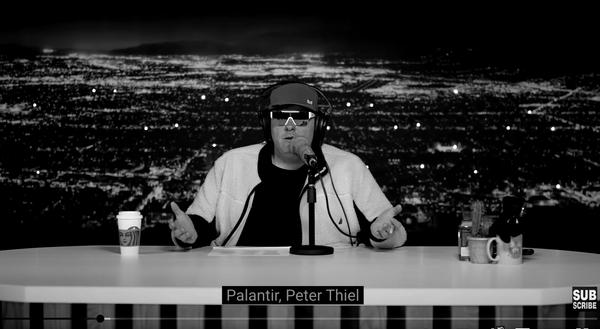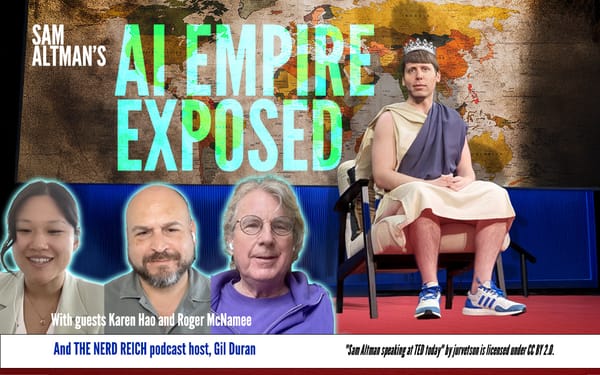Résumé puffing scandal sparks tech war on S.F. press

The Point: A candidate for the San Francisco Board of Supervisors got caught puffing up his résumé and – in a highly-anticipated escalation – billionaire-funded tech "mods" declared MAGA-like war on the San Francisco press. There may be a method to their madness.
The Background: The story is simple and hardly unique: Bilal Mahmood, a candidate for office in San Francisco, got caught puffing up his résumé.
He called himself a "neuroscientist" because he had done some work with an esteemed neuroscientist at Stanford. But after a group of neuroscientists challenged him and asked him to prove his credentials, Mahmood erased the claim from his campaign materials. The San Francisco Chronicle, being a newspaper, did a story about it.
Common résumé lies
The Résumé Puffer is a recurring character in politics and in business. Former congressman George Santos immediately comes to mind, but he was just the latest in a long procession of people to get caught padding or puffing their achievements.
Lies about academic credentials seem to be the most common, followed by lies about athletic feats. Just as some people use filters to make their pictures look better, some people use lies to inflate their professional achievements.
I once had an intern who answered phones and handled other light clerical duties. Their LinkedIn profile says they wrote speeches for Gov. Jerry Brown. That's funny, because I worked for Brown for five and a half years and never wrote a speech. Nobody wrote speeches for Brown.
But in a world of cutthroat competition, "wrote speeches" sounds a lot more interesting than "answered phones." Just as "neuroscientist" packs more punch than "worked with a neuroscientist."
Some people get very far on such exaggerations, fibs and lies. Here's a list from Business Insider featuring "17 successful executives who have lied on their résumés." And here's a story that looks deeper into why people lie on their résumés.
Of course, let's not forget Richard Parina, the conservative S.F. activist who spent decades pretending to be a decorated war hero before faking his own death earlier this year. People lie so often about having served in the military that the phenomenon even has a special name, "Stolen Valor."
A political error
The twist: This might have been a blip in Mahmood's campaign for District 5 supervisor. It was a relatively minor fudge, and it's not clear why the label of neuroscientist would give anyone a clear advantage in a local campaign. But instead of cutting Mahmood a break, the tech zillionaire-funded groups currently pumping cash into S.F. politics are using the incident to declare war on the San Francisco Chronicle.
"The @sfchronicle is not a news publication anymore," wrote Sachin Agarwal, co-founder of Grow SF, an organization heavily funded by Y Combinator CEO Garry Tan. "They will publish lies to push their political agenda. Read @Sharkyl’s thread about their false coverage of @bilalmahmood."
He was referring to a Twitter thread by local business person Sharky Laguana. Laguana attacked the Chronicle for daring to write about the "smear" against Mahmood. He argued that Mahmood is, in fact, a neuroscientist.
The tech-funded Blue Check crowd rushed in to amplify Laguana's bizarre thread. They seem to think it's unfair that Mahmood's opponents could have planted the story. But negative stories get planted all the time during campaigns. That's Politics 101, kids.
As of this writing, the tech-funded anti-Chronicle crusade is in full swing. They're declaring the Chronicle – a mainstay in this town since 1865 – to be dead and gone forever.
Big problem, though: Mahmood already admitted that he shouldn't have called himself a neuroscientist. He conceded this point when he deleted the information from his campaign materials. In doing so, he guaranteed himself a story in the paper of record – because newspapers typically cover these incidents.
Chronicle editors also removed references to Mahmood's neuroscientist claims from three separate stories. That's a big deal, because it shows some level of high-level review at the paper. Correcting multiple stories at once is serious.
By overreacting to basic journalism, Mahmood's defenders guarantee that more voters will hear about the scandal, which might have faded away over the Easter weekend. Their over-emotional and overwrought attacks on the Chronicle don't make much political sense. But these tech-funded political types seem hellbent on undermining the local media.
Is there a method to their madness?
Blue Check media attacks
In recent months, S.F. blue checks like Garry Tan and his ilk have also gone after Mission Local and the Standard for simply reporting legitimate news stories.
Most telling is that they even attacked the Standard – owned by tech billionaire Michael Moritz – for allegedly slanting the news against the tech-funded cause. (Meanwhile, SF progressives are wary of the Standard because it is owned by a tech billionaire, and they regularly accuse it of working to further the agenda of the same tech-funded folks who simultaneously accuse it working for the progressives! For my part, I think the current iteration of the Standard has fine editors and reporters doing great local journalism.)
It's clear that the S.F. Blue Checks are unhappy with coverage of their efforts to take over City Hall. It upsets them that journalists are independent and skeptical. They seem to believe that a journalist's job is to write glowingly about them and negatively about their enemies. They don't want the sword to swing both ways. And because they have lots of money but little political experience, they feel this is a rational thing to openly demand.
'Parallel' media strategy
People criticize news outlets all the time – as they should. Criticism of media can be constructive, fair and necessary. But what these folks are doing is different. In a strategy reminiscent of that used by Elon Musk and Donald Trump, they're trying to completely undermine the credibility of San Francisco's mainstream media.
In its place, they want to create what they call a "parallel" media structure of publications that cater to their political agenda. They accuse establishment outlets of being "fake news" ... while simultaneously plotting to create their own actual fake news outlets. (The name of this newsletter, Parallel Mirror, is an allusion to this strategy.)
In fact, this anti-Chronicle tantrum comes just as a new publication prepares to enter the local marketplace of ideas. The Voice of San Francisco, a new nonprofit funded by the usual tech suspects, will soon make its debut. Expect it to provide a model for what Garry Tan and his Blue Check ilk consider "real" journalism.
Spoiler: It will be their political agenda dressed up – sloppily and unconvincingly – as "news."
Conclusion: Unhinged attacks on the credibility of the Chronicle and other mainstream news outlets will intensify. The billionaire-funded groups need to create lots of noise to undermine established media and create momentum for their "parallel" propaganda organ, which – if history is any guide – will flop.
Coming Soon: My next post will delve into the One Big Thing that was missing from that Garry Tan profile in the New York Times.





